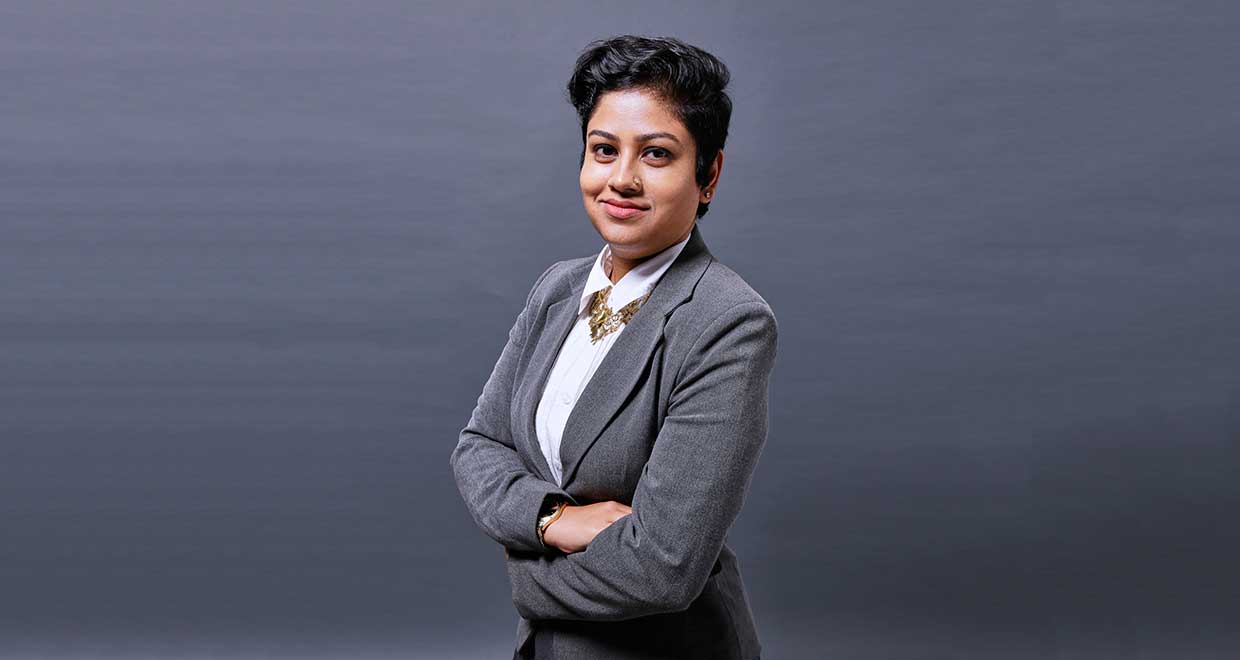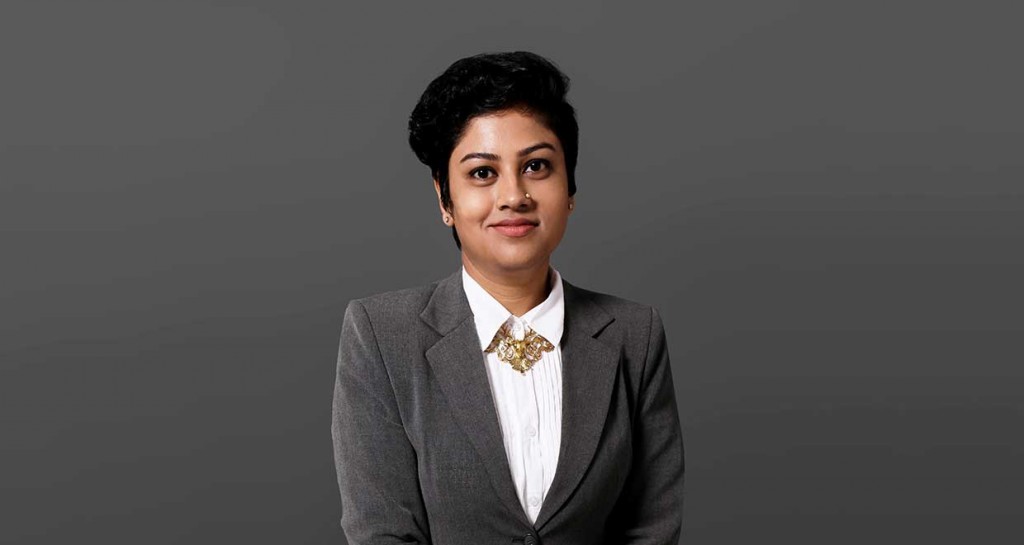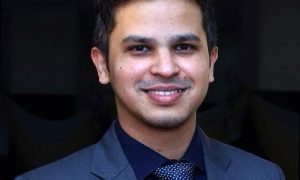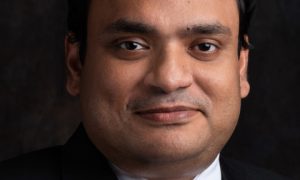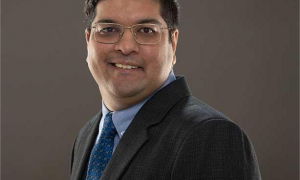Vaishnavi Bhaskaran graduated from National Law University, Jodhpur in 2010. She is currently a partner at Spectrum Legal where she heads the Corporate-Commercial and Employment Law Practice. In this interview, she talks to us about:
- Her experience at NLU, Jodhpur and decision to pursue law
- Her view on internships and augmenting a CV
- Her professional journey and founding ‘The Little Black Coat’
- Spectrum Legal and her views on the field of law in the contemporary context
What incident, influence or interest prompted you to think of law as a career? If not law, what other options would you have considered for a career?
I have wanted to be a lawyer since the beginning of my teenage years. The idea (somewhat clichéd) first came to me after I had read a series of John Grisham novels in quick succession. Of course, the reality is vastly different from what one reads about, and I realised that soon after I entered law school. Fortunately for me however, the reality was not unpleasant. I had briefly toyed with the idea of journalism, but in the end, it was to be law.
What would you like to say about your experience with college admissions and competitive exams?
I was very clear that I wanted to attend one of the top-ranked national law schools, and I was very fortunate to have found a place at NLU Jodhpur.
How would you describe your life while studying at NLU Jodhpur? What activities did you tend to favor?
My time at NLU was undoubtedly one of the best periods of my life, and has gone a long way in shaping me, both as a professional and as a person. While at NLU, I had a clear vision of what I wanted to do once I graduated, and I focussed on doing things that would get me closer to my goal. I tended to focus on subjects that I thought would help me once I started practising, and pursued internships that would further my goals.
Were you always clear on corporate-commercial law as your field of expertise or were you drawn towards it while studying there?
It was after my very first litigation internship that I realised that litigation wasn’t my calling. Like most law students who start off thinking they will graduate and pursue litigation, I did initially pursue a couple of litigation internships. After I completed my second year however, I found an internship opportunity where I was given both litigation and non-litigation related work, which is when I realised that I wanted to be a corporate lawyer. Subsequently, I chose to pursue the corporate law honours course that NLU offers, in my fourth and fifth years.
Beyond academic experience what would augment CVs of law students and make them better candidates for the same?
Obviously, being from a good university and having a good GPA will more often than not, help you secure a good job in the legal field. However, even internships can open up doors in most organisations, if one is found to be hardworking, resourceful, knowledgeable and eager to learn.
What kind of internships would you recommend law students opt for to start building the sort of versatility and widened range of law that you are well versed with today?
Most small to medium law firms in Bangalore do not have the precise demarcations when it comes to areas of practice, as many larger firms do, and as a result, most lawyers tend to have wide exposure within the broader boundaries of their chosen specialisation.
In my experience, interning with small and medium size firms provides interns an opportunity to learn a wider range of subjects.
Krishnamurthy & Co. (K Law), an established corporate commercial law firm, was your first placement directly after college. How did your experience there help you add to your understanding and practice of law in India?
Immensely. In my opinion, K Law is an excellent place to start one’s career. During my time there, I worked on a very wide variety of issues and was very fortunate to have been given a high degree of responsibility at a relatively early age. Both these factors were instrumental in helping me start Spectrum Legal.
What prompted your shift from K Law to Poovayya & Co., Advocates & Solicitors in 2011?
At that point, I was keen to acquire more exposure and see how other firms functioned. I had interned with Poovayya & Co. previously, and had found the experience very rewarding and enjoyable.
What went into founding The Little Black Coat in 2013? What were your motivations for the same and how did it affect your perspective on legal startups?
Even while I was in law school, it remained my ultimate objective to set up my own law firm. At the time when I took the decision to go independent, the startup ecosystem in Bangalore was booming, and it was only a matter of time before they all needed lawyers.
What did you learn from your experience with startups while running The Little Black Coat?
Working with startups is a completely different experience from working with bigger and more established entities. Established companies tend to be business savvy and typically require only legal advice. Working with startups however, requires you to do a great deal of handholding and walking them through business and financial issues, in addition to providing them with legal counsel.
Tell us what drove you to set up Spectrum Legal with Chinnappa and Co.
By that point I had developed a small client base, and while being an independent practitioner was extremely satisfying, it is also limiting because you cannot service your clients’ needs beyond your area of practice. Additionally, being only one person, you also face issues because of a lack of bandwidth. At that point, setting up a law firm seemed the natural and logical step, and when I met my partners, I found the team a good fit to take that step with.
What was the motivation behind creating a law firm that aims to provide all types of legal services across different fields of law in the same firm?
Like I said above, when you practise only one area of law, it can become difficult to service a client in a complete manner. A full-service law firm brings with it a unique synergy and the ability to meet all the legal needs of a client in-house, which was the motivation in creating a firm that provide a broad spectrum of legal services.
Working for a firm, corporates especially, is generally seen as a time intensive lifestyle which leaves little room for much else. How true would you say this is from your own experience?
There is a great deal of truth in that. Law is indeed a time-intensive profession, but so are most careers these days. In order to succeed, one must be prepared to put in the hard work. Having said that, I think as one becomes older and more senior, there comes a time when an individual can decide what his or her priorities are, and accordingly devise a schedule in keeping up with those priorities.
What are your thoughts on the traditional ideas of specialization in singular core areas of law as opposed to the contemporarily broader approach to a wider field of law with multiple specialties?
In my opinion, this is a result of the market where clients are faced with multiple legal issues. When it comes to law, most of the learning happens while one is working, and as such, a specialisation develops when one has been working for a while. I personally prefer a wider area of functioning, as I find this variety exciting and challenging.
What would be your parting message to the readers?
Before you graduate, and during the initial stage of your career, the choices one is faced with and the possibilities can be overwhelming. However, you’re in for the long haul, and it’s imperative to never lose the joy that comes from practising law. Initially, one’s focus should be solely to learn and attempt to master one’s field, everything else will follow at its own pace.

